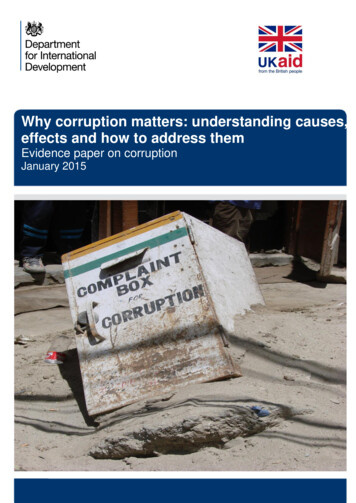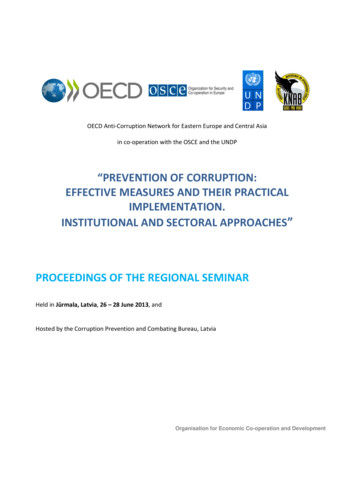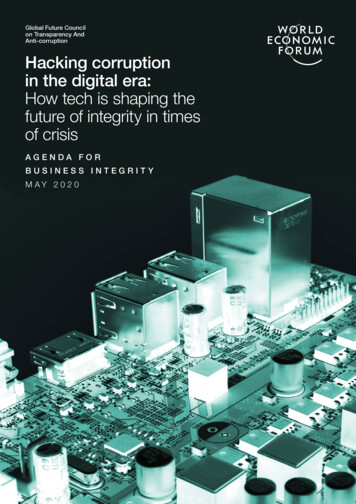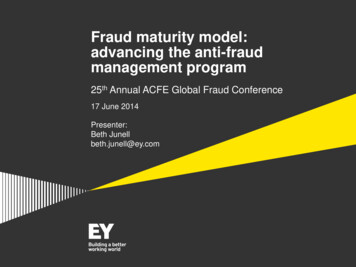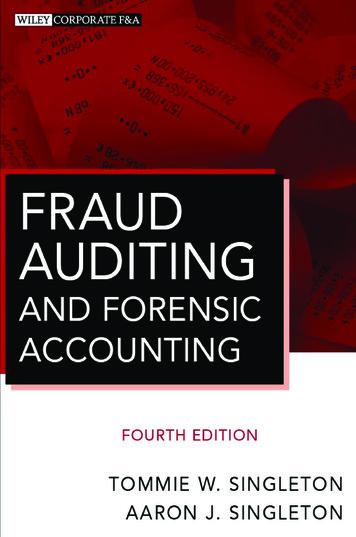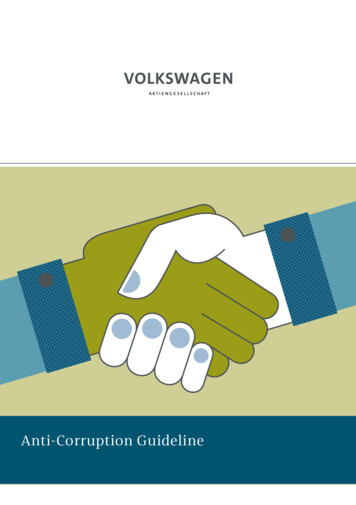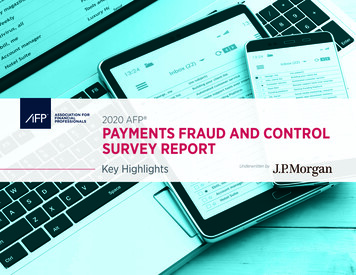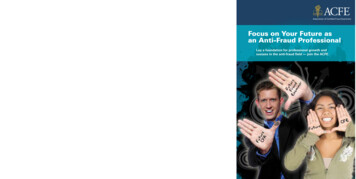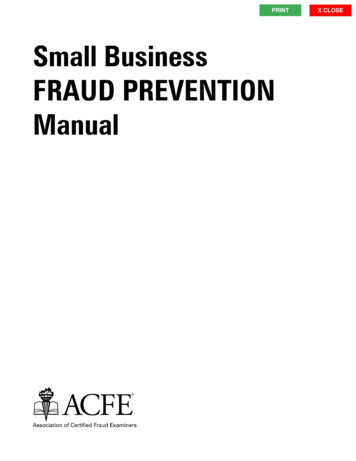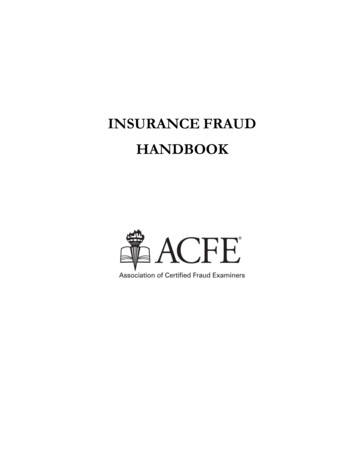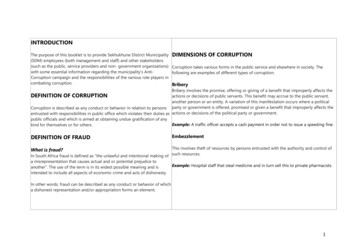
Transcription
INTRODUCTIONFraud and CorruptionThe purpose of this booklet is to provide Sekhukhune District Municipality DIMENSIONS OF CORRUPTION(SDM) employees (both management and staff) and other stakeholders(such as the public, service providers and non- government organizations) Corruption takes various forms in the public service and elsewhere in society. Thewith some essential information regarding the municipality’s Antifollowing are examples of different types of corruption.Corruption campaign and the responsibilities of the various role players incombating corruption.BriberyBribery involves the promise, offering or giving of a benefit that improperly affects theactions or decisions of public servants. This benefit may accrue to the public servant,another person or an entity. A variation of this manifestation occurs where a politicalCorruption is described as any conduct or behavior in relation to persons party or government is offered, promised or given a benefit that improperly affects theentrusted with responsibilities in public office which violates their duties as actions or decisions of the political party or government.public officials and which is aimed at obtaining undue gratification of anyExample: A traffic officer accepts a cash payment in order not to issue a speeding fine.kind for themselves or for others.DEFINITION OF CORRUPTIONDEFINITION OF FRAUDEmbezzlementThis involves theft of resources by persons entrusted with the authority and control ofIn South Africa fraud is defined as “the unlawful and intentional making of such resources.a misrepresentation that causes actual and or potential prejudice toExample: Hospital staff that steal medicine and in turn sell this to private pharmacists.another”. The use of the term is in its widest possible meaning and isintended to include all aspects of economic crime and acts of dishonesty.What is fraud?In other words, fraud can be described as any conduct or behavior of whicha dishonest representation and/or appropriation forms an element.1
2 Blow the Whistle on Fraud and CorruptionFraudThis involves actions or behavior by a public servant or other person or entity that foolsothers into providing a benefit that would not normally accrue to the public servant, orother persons or entity.Example: A public servant that registers a fictitious employee in order to collect thesalary of that fictitious employee.ExtortionThis involves coercing a person or entity to provide a benefit to a public servant,another person or an entity in exchange for acting (or failing to act) in a particularmanner.Example: A public health official threatens to close a restaurant on the basis offabricated health transgressions unless the owner provides the public health official withregular meals.32
d and CorruptionIndicators of Fraud and CorruptionAbuse of powerINDICATORS OF FRAUD ANDCORRUPTIONThis involves a public servant using his or her vested authority to improperly benefit another publicservant, person or entity (or using vested authority to improperly discriminate against another publicservant, person or entity).Example: During a tendering process but before actual selection of a successful contractor, the headof department, municipal manager expresses his or her wish to see the contract awarded to a specificperson.Conflict of interestThe following are indicators (red flags) that could bean indication of the potential existence of fraud andcorruption:Indicators that individuals may be susceptibleto committing fraudUnusually high personal debtsThis involves a public servant acting or failing to act on a matter where the public servant has anLiving beyond one’s meansinterest or another person or entity that stands in a relationship with the public servant has an interest.Example: A public servant considers tenders for a contract and awards the tender to a company ofwhich his or her partner is a director.Abuse of privileged informationExcessive gambling habitsAlcohol / drug problemsUndue family or peer pressure to succeedFeeling of being underpaidFeeling of insufficient recognition for job performanceClose association with suppliersThis involves the use of privileged information and knowledge that a Public servant possesses as aresult of his or her office to provide unfair advantage to another person or entity to obtain a benefit, orto accrue a benefit him or herself.Wheeler-dealer attitudeDesire to “beat the system” Criminal recordExample: A local government official has, as a result of his or her office, knowledge of residential areas Not taking vacationsthat are to be rezoned as business areas, and then informs friends and family to acquire the residentialproperties with a view to sell these as business properties at a premium.Not allowing someone access to area of responsibilityUndisclosed conflict of interest andRationalization for conflicting behavioral patterns.3
FavoritismThis involves the provision of services or resources according to personal affiliation (for example ethnicor religious) of a public servant.Example: A regional manager in a particular province ensures that only persons from the same ethnicgroup are successful in tendering for the supply of food.NepotismIndicators that the Sekhukhune Municipalitymay be a target for fraudsters This involves a public servant ensuring that family members are appointed to public service positionsor that family members receive Contracts from the state.Example: A head of department / municipal manager appoint his or her sister’s child to a positionwhen a more suitable candidate has applied for the position.The above illustration of the manifestations of corruption is by no means complete or exhaustive.Corruption appears in various permutations and degrees of intensity. A Municipality that lacks competentpersonnelA Municipality that does not enforce clearlines of authority and responsibility.A Municipality that does not enforce properprocedures for authorization of transactionsA Municipality that lacks adequate documentsand recordsNo separation of responsibilities between thevarious duties within a business cycleInadequate disclosure of personal investmentand other income; Operating on a crisis basisToo much trust placed on key employeesFailure to discipline violators of Municipalpolicy; andInadequate background and referencechecking before hiring new employees4
Legal Framework on Fraud andRemedies available within the full extent of the law.Indicators of opportunities to commit fraud Appropriate prevention and detection controls will be applied. These include thecontrols and checking mechanisms as prescribed in existing policies, procedures andRapid turnover of key employees through resignation or other relevant prescripts to the activities of the SDM and systems of internal control.dismissalIt is the responsibility of employees of the SDM to report all incidents of fraud,Dishonest and dominant managementcorruption, theft, maladministration or any other dishonest activities of a similarInadequate training programmesnature to his or her manager. If the employee or official is not comfortable ofComplex business structuresreporting such matters to his or her manager, he or she should report the matter toNo effective internal audit functionhis or her manager’s superior, with final recourse to the Municipal ManagerContinuous problems with regulatory agencies andLarge year-end and unusual accounting transactions.Employees may also report incidents by using the Municipal’s Disclosure HotlineLEGAL FRAMEWORK reporting facility on 0800 000 224 and Faxwish to remain anonymous or for any other reason.0800 007 788, if theyThe following legislation and policies, amongst others, deal withcorruption in South Africa:All Directors are responsible for the detection, prevention and investigation of fraud,corruption, theft, maladministration or any dishonest activities of a similar nature,within their areas of responsibility.Corruption Act, Act 94 of 1992Municipal Finance Management Act, Act 56 of 2003Treasury RegulationsThe municipality will take appropriate legal recourse to recover losses or damagesAnti-Fraud and Corruption Policy of the Municipalityarising from fraud, corruption, theft or maladministration.Protected Disclosure Act andIf the matter could lead to the laying of criminal charges, it must also be reported toCode of conduct for the Municipal Code Conductthe South African Police Services.5
In view of the legal framework and government policies:Where an official is alleged to have committed an act of fraud, corruption, theft ormaladministration, the Municipal Manager will institute disciplinary proceedingswithin a reasonable period, in terms of the disciplinary code and procedure of theMunicipality.It is the policy of the Sekhukhune District Municipality that fraud,Corruption, theft, maladministration or any other dishonest activities of a PROTECTIONsimilar nature will not be tolerated. In addition, these will be investigatedand followed up by the application of allOF WHISTLE BLOWERSWhat is whistle blowing?6 Blow the Whistle on Fraud and CorruptionTraditionally, the term ‘whistle blowing’ has been associated with the image ofanonymous police informants – people who informed on their comrades during theapartheid era, often with devastating consequences. In today’s usage, whistleblowing is the process by which employees or other individuals can raise a concernabout serious malpractice within a Municipality7Protection of Whistle BlowersPotection of Whistle Blowers6
It is akin to an early warning system and a means of enabling employersto find out when something is going wrong in time to take correctiveaction.Since February 2000, South Africa has had the most far-reaching “state ofthe art” whistle blowing legislation in the world. The ProtectedDisclosures Act, 26 of 2000 aims to reassure workers with genuineconcerns about malpractice that there is a safe alternative to silence, byproviding protection against victimization to those responsible employeeswho speak up when they see something going wrong. Employees who arevictimized and subjected to an occupational detriment for blowing thewhistle on improprieties now have a legal remedy against their employer.The Protected Disclosures ActAnti-Corruption HotlineThe toll free number for the hotline isdesigned to achieve the following:To deter potential fraudsters by making all employees and stakeholders aware thatthe SDM is not a soft target, as well as encouraging employee participation insupporting, and making use of this facility. In order to encourage hesitant whistleblowers, the caller does not pay for the call The Protected Disclosures Act, 26 of 2000 makes provision for theProtection of employees who make a disclosure that is protected in termsof this Act.Any disclosure made in good faith and substantially in accordance withany procedure prescribed by the employee’s employer for reporting isconsidered a protected disclosure under this policy. An employee makinga protected disclosure is protected from victimization on the basis of thedisclosure.0800 000 224. The hotline is To raise the level of awareness that the SDM is serious about fraud andcorruptionTo detect incidents of fraud through encouraging whistle blowers toreport incidents which they witnessTo assist the SDM in managing the requirements of the ProtectedDisclosures Act by creating a channel through which whistle blowers canreport irregularities that they witness or which come to their attention.Anonymous persons are also encouraged to report to the hotline. Thehotline will also protect the identity of whistle blowers who wish to remainanonymous.To assist the SDM to identify areas of fraud risk so that preventive anddetective controls can be improved.7
An employee or official who suspects or reports suspected dishonestactivity or such activity, which he or she has witnessed, should be affordedthe opportunity to remain anonymous should he or she so require.FREQUENTLY ASKED QUESTIONSDirectors should discourage employees and officials from makingallegations, which are false and made with malicious intentions. Wheresuch malicious or false allegations are discovered, the person who madethe allegations must be subjected to Municipal disciplinary action. TheProtected Disclosures Act does not protect false disclosures.SDM management are ultimately responsible in terms of Section 56 of theMunicipal Finance Management Act (MFMA) to ensure that propercontrols are in place to prevent and detect fraudulent and irregularactivities.Who is responsible for fraud prevention and detection?All employees should be aware of the fraud indicators and reportsuspected acts of fraud and corruption through the appropriate channels.What is the Anti-Corruption Hotline?The hotline is a channel through which employees, suppliers, contractors,and other third parties can report irregular activities, free fromvictimization or repercussions.The primary means of detecting Fraud and corruption will and shouldalways remain a sound system of internal controls and regular internalaudits. These measures should be supplemented with an anti-fraud andcorruption-reporting channel where information regarding fraud andcorruption is collected and reports investigated.8
Frequently Asked Questions on Fraud and CorruptionVital to this function is the assurance of anonymity,commitment to investigate all irregularities, protection ofwhistle-blowers and consistent application of the fraud policy,regardless of the seniority of the alleged offender.Frequently Asked Questions on Fraud and Corruption Why should I report incidents of fraud and corruption?Who operates the Hotline?It is every member of society’s responsibility to report incidents ofA professional external independent party which provides a 24hour professional service available in five official languages isoperating the hotline. This ensures that the reporter can remainanonymous if he/she so wishes.What is the Anti-Corruption Hotline number?0800 000 224Fraud and corruption because:It adversely affects all sectors in society and impacts most directly on the poor What are examples of fraud and corruption?The following actions can be considered to be fraudulent:Incidents of unauthorized, irregular or fruitless and wasteful expenditure as defined inthe Municipality Finance Management Act andAny similar or related irregularity.It corrodes the national culture and ethos of democracy and good governance at alllevels and sectors of societyIt depletes both government and civil society of scarce resources that are needed toensure economic prosperity, equality and a better life for allIt is blight on society caused by the worship of self and it is wrong.What can I do to help to eradicate fraud and corruption?9
Any dishonest, fraudulent or corrupt act theft of funds,supplies, or other assets.Maladministration or financial misconduct in handling orreporting of money, financial transactions or other assets: Making a profit from insider knowledgeDisclosing confidential, proprietary, classified orrestricted Information to outside partiesIrregularly accepting, requesting, offering or givinganything of material value to or from contractors,suppliers, or other persons providing services/goods tothe MunicipalityIrregular destruction, removal, or abuse of records,furniture, and EquipmentDeliberately omitting or refusing to report or act uponreports of Any such irregular or dishonest conductActs of financial misconduct contemplated in terms ofsections 175 to 177 of the Municipality FinanceManagement ActWhere I believe in good faith that I have identified an incident of Fraud, theft,corruption, maladministration and any related or similar incidents, REPORT throughthe appropriate channels such as the Anti- Corruption Hotline. 0800 000 224Is there a written Code of Ethics?Yes, the SDM subscribes to the Code of Ethics as developed by the Municipal SystemActWhy should there be a Code of Conduct?To ensure accountability in terms of agreed values and value systems. Fraud andCorruption thrive in an environment devoid of morals and ethics. Therefore, at theheart of the cure lies the establishment of an environment that is rich in moral andethical values and behavior. The adoption of a well thought out Code of Conduct,encompassing the highest level of moral and ethical values is therefore critical inensuring the success of any fraud prevention strategy.Frequently Asked Questions on Fraud and CorruptionWhat are the values cherished by the SDM? Absolute integrityA culture of honesty Loyalty10
ProfessionalismAcceptance of responsibility and accountabilityA positive public imageConfidence from the publicStriving for and maintaining credibilityHigh standards of service deliveryA sense of pride in belonging to the SDMSanctioning bad, and rewarding good behavior andAll other positive attributes contributing toward sound ethical standards.What is a Fraud Prevention Plan?This document contains the detailed procedures that needs to be followed in order to implement the fraud prevention strategy. It is an overall “gameplan” setting out how the SDM will endeavor to reduce fraud and corruption within its ranks. This document will cover aspects such as the relevantrole players, special initiatives to seek out fraud, highlighting red flags, setting out details of the fraud response plans, actions to be taken and so on.Does the SDM have a Fraud Prevention Plan?Each of the Municipal must have fraud prevention plan that is in line with their specific environment.1211
intended to include all aspects of economic crime and acts of dishonesty. In other words, fraud can be described as any conduct or behavior of which a dishonest representation and/or appropriation forms an element. Fraud and Corruption DIMENSIONS OF CORRUPTION Corruption takes various forms in the public service and elsewhere in society. The
